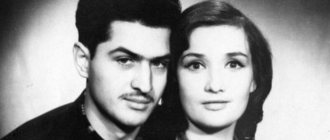Biography of Andrei Bandera
Andrei Bandera is a famous and beloved singer, a real example of the fact that true talent does not require large financial investments for “promotion.” Andrei Bandera is also known as a supporter of the idea of “people's production”. Bandera's real name is Eduard Izmestyev; in 2014, the recording studio broke the contract with the singer, and now chansonnier Evgeniy Konovalov performs under the name “Andrey Bandera”.
Folk singer Andrei Bandera, aka Eduard Izmestyev
Crimes
Today in Ukraine there are many people who revere Stepan Bandera almost as a saint. Striving for the independence of one's homeland is a noble cause, but nationalism never stops at praising one's people. He always needs to prove his superiority by humiliating his neighbor or, even worse, destroying him physically. In particular, many European and Russian historians consider the facts of Bandera’s involvement in the Volyn massacre to be proven, when thousands of Poles and Catholic Armenians, whom Bandera’s followers considered “second Jews,” were killed.
Bandera Stepan, whose biography, crimes and works require serious study, is a controversial personality, but undoubtedly extraordinary. His name currently continues to be a symbol of the nationalist movement and inspires some hot and, let’s say, not entirely smart heads to commit such terrible actions as shelling residential areas of their own cities.
Andrei Bandera's childhood
The singer's real name is Eduard Anatolyevich Izmestyev.
He was born on April 25, 1971 in the small mining town of Kizel, Perm Region. The boy remembered Edward’s school years not so much for his lessons and homework as for his music lessons - in those years the boy enthusiastically played the drums. Not far from the place where the guy lived, there was a gypsy camp. Edward spent a lot of time there: he was friends with the gypsy boys, listened to how amazingly soulfully and soulfully the adult gypsies sang their songs with a guitar. Absorbing these unusual intonations, Edward fell in love with music even more.
The beginning of Andrei Bandera's creative career. "Atlantis"
Studying at the Kizelovsky Mining College, where the guy entered in 1985, was supposed to put an end to the young man’s musical career. But it turned out the other way around - during his studies, Izmestyev did not stop doing what he loved, and in 1987 he even organized his own musical group, Atlantis. Her playful pop repertoire was far from the compositions performed by Andrei Bandera today.
Young Eduard Izmestiev and the Atlantis group
After graduating from technical school, the guys entered adulthood, everyone went to work; Eduard, like most residents of his city, began working in a mine, but did not abandon his musical brainchild.
Music is the main passion in the life of Eduard Izmestyev
Edward was simultaneously a songwriter, a soloist, a composer-arranger, and also a producer of Atlantis. The group's success was not long in coming. Possessing enormous potential and many ideas as a lyricist and composer, Eduard wrote about 100 songs for his group (together the group recorded 11 albums), which were successfully included in the rotation of Avtoradio and participated in numerous concerts and festivals. The history of the Atlantis group ended in 1999, along with Izmestyev’s move to Moscow.
Death sentence, prison and... unexpected freedom
Back in 1928, he became a student at the Lvov Higher Polytechnic School, majoring in agronomy, but was never able to defend his diploma. In 1934, for organizing the murder of the Minister of Internal Affairs of Poland B. Peratsky, Stepan, along with other participants in the attempt, was arrested and sentenced to death by a court decision. Later, capital punishment was replaced by life imprisonment.
Stepan Andreevich Bandera was released completely unexpectedly. This happened in September 1939, when, after the retreat of the Polish army, the guards of the prison in which he was kept fled. Having made his way illegally to Rome, he met with the new head of the OUN, Andrei Melnikov, who replaced Yevgeny Konovalets, who was killed by NKVD officers, in this post. Despite the commonality of interests, serious disagreements arose between them from the first day, as a result of which the organization itself soon split into two opposing groups: Bandera and Melnik.
Professional development of Andrei Bandera
In 1999, Edward received an invitation to work as an arranger.
Izmestyev “had a hand” in the repertoire of many famous performers, such as Dima Bilan, Vitas, Alexander Marshall. But the love of creativity and the desire to pursue my own career soon took over, and in 2000 a project was born under the name “Andrei Bandera”. Bandera’s first song “By Stage” in the chanson genre did not “take off”, remaining almost unnoticed. A number of subsequent compositions faced the same fate. This continued until 2004, until Andrei Bandera wrote a truly soulful and folk song “Ivushki”, which the public liked so much that it made Andrei popular in one day, immediately after its release into radio rotation "Chanson".
Andrei Bandera - “Ivushki” After the presentation of “Ivushki”, Andrei Bandera’s career rapidly took off. In 2007, his debut album “Because I Love” was released. The huge circulation of the album could not satisfy public demand, so the record had to be re-released several times.
You could hear Andrei Bandera on radio “Chanson”
The singer’s second album, “It’s impossible not to love,” was released 2 years later – in 2009. It became even more popular than Bandera’s debut album. In the same year, the singer’s duet with performer Rada Rai was released - the song “You Fly, My Soul” found a response in the souls of all lovers of Russian folk songs. Andrei Bandera and Rada Rai - “You fly, my soul”
Bandera movement
Poland disappeared from the map of Europe. Western Ukraine was divided between Germany and the USSR. The enemy for Bandera has changed. Germany took Poland's place. While he was in prison, big changes took place in the OUN. The former leader, Evgen Konovalets, was blown up by a bomb in Rotterdam. Andrey Melnik laid claim to unconditional leadership. Their meeting took place in Italy. Stepan Bandera demanded that Melnik stop all contacts with Germany. He refused. The OUN split into two parts. Bandera headed the OUN (Bandera movement).
Actually, after a quarrel between the two OUN leaders, the definition of “Bandera” came into play. He still had to begin cooperation with Nazi Germany. He met the German attack on the USSR in Krakow, while under vigilant police surveillance. He was strongly discouraged from visiting his native places. The German troops that entered Lvov at the end of June 1941 included 2 battalions staffed by his supporters. On the same day, one of the leaders of the OUN (b) Yaroslav Stetsko read out the “Act of Revival of the Ukrainian State” in Lviv. The Germans had absolutely no need for an independent Ukraine. They had plans that were not their own. They did not recognize any “independence”, and all its guardians were quickly arrested.
Andrey Melnik
Stepan Bandera with his wife and daughters were placed in the Sachsenhausen concentration camp. There he soon met Andrei Melnik, who always relied on Germany. In the concentration camp, Stepan Bandera had some privileges compared to other prisoners. He was fed a little better and was sometimes allowed to meet his family. The Germans have always been very calculating.
Andrey Melnik in old age
Bandera was remembered in 1944, when the Soviet Army approached the lands of Western Ukraine. According to the calculations of the German command, Ukrainian nationalists were supposed to start a partisan war in the liberated areas. Bandera made Germany’s recognition of the “Act of Revival of the Ukrainian State” a mandatory condition for further cooperation. He never managed to achieve this.
Back in 1942, in Galicia, without the participation of Stepan Bandera, the Ukrainian Insurgent Army of the UPA began to form, which became the core of the resistance and received assistance from the Germans in the form of weapons. Stepan Bandera from Germany tried to lead the “abroad” nationalist formations.
Within the OUN, especially among its members hiding in the forests of Ukraine, opposition grew, accusing it of being out of touch with real life and dogmatism.
Stepan Bandera met the end of the war in the part of Germany occupied by the British. The British intelligence services quickly found him. In turn, the Americans continued to look for Bandera as an accomplice of Nazi Germany and he had to hide from them for a couple of years.
Since then, the only enemy for Ukrainian nationalists has been the Soviet Union. The guerrilla war in Western Ukraine continued until the mid-50s.
Many years after the destruction of the main forces of “Bandera,” former UPA fighters were found in villages hiding in the cellars of relatives. Such tenacity was only demonstrated by Japanese soldiers who did not recognize surrender, and who continued to be captured in the jungles of the Philippines until the 70s.
Andrey Bandera: folk producing
The idea of “people's producing” came to Andrei Bandera's mind a long time ago, at the very beginning of his career, when he realized how difficult it was for a person from the provinces, from the outback, to break onto the big stage in the world of show business. With the development of the Internet, the singer’s idea became quite realistic. Eduard Izmestiev (Andrei Bandera) - “The Enchanted Bird” The official website of Andrei Bandera invited his fans to take a direct part in the life and work of their idol. Anyone could propose a song idea, lyrics or music, as well as invite a singer to tour in their city. Bandera’s fans liked this extraordinary step. They actively participated in the project, and this cooperation soon bore fruit. Thanks to the collaboration of Andrei Bandera with his “people’s producers,” such popular songs as “Metelitsa” and “Fields of Russia” were released.
Eduard Izmestyev personally writes all the music for his songs
With the help of fans, Andrei Bandera’s third album, “Touch,” was recorded.
After the war
After the defeat of fascism, Bandera Stepan, whose biography was repeatedly “rewritten” to please one or another political force, remained in West Germany and settled in Munich, where his wife and children also arrived. He continued active political activity as one of the leaders of the OUN, many of whose members also moved to Germany or were released from camps. Bandera's supporters declared the need to elect him as the lifelong leader of the organization. However, those who believed that the activities of nationalist associations should be managed on the territory of Ukraine did not agree with this. As the main argument in favor of their position, they pointed out that only by being on the ground can one soberly assess the situation, which had radically changed during the war years.
In an effort to expand the number of his supporters, Stepan Bandera (biography is briefly presented above) became the initiator of the organization of the ABN - Anti-Bolshevik Bloc of Peoples, headed by Yaroslav Stetsko.
In 1947, nationalists who disagreed with his position finally abandoned the OUN, and he was elected its leader.
Personal life of Andrei Bandera
The personal life of Andrei Bandera aka Eduard Izmestiev is a sealed secret. The singer carefully protects his loved ones from the unnecessary curiosity of fans and annoying journalists. Andrei answers all questions about the family unequivocally: “This is a big secret. My relatives asked me not to tell anything about them.”
Eduard Izmestiev (Andrey Bandera) with his daughter
All that is known about Andrei Bandera’s wife is that she supported the singer in every possible way at the beginning of his journey and predicted a concert for him in the Kremlin, which at that time was difficult to even imagine. The prophecy came true - Edward actually gave a concert in the Kremlin, and after that he stated that nothing would have worked out for him if it were not for the support of his wife.
Eduard Izmestyev has a younger brother, Victor. At the beginning of their careers, they planned to perform together as a duet. But fate decided otherwise, and Victor became a backing vocalist in Andrei Bandera’s team.
Title of Hero of Ukraine
Posthumously in 2010, Stepan Bandera received the title of Hero of Ukraine, which was awarded to him by President Viktor Yushchenko “for his invincibility of spirit.” Then Yushchenko noted that millions of Ukrainians had been waiting for a long time for Bandera to be awarded the Hero of Ukraine, and Yushchenko’s decision was made by stormy applause from the public present at the award ceremony for Stepan Bandera’s namesake grandson.
However, this event caused a great public outcry; many disagreed with Yushchenko’s decision. The European Union also reacted negatively to this event, and therefore called on the newly elected President Viktor Yanukovych to reverse the decision.
Monument to Stepan Bandera
At the present time, the personality of Stepan Bandera evokes different points of view in society: if in Western Ukraine Bandera is considered a symbol of the struggle for independence, then Eastern Ukraine, Poland and Russia perceive this political figure mostly negatively.
Andrey Bandera today
In 2013, she broke off relations with Eduard Izmestiev. His contract expired, which was aggravated by the flaring events in Ukraine (singers Andrei Bandera and Denis Maidanov came under an unofficial ban). The rights to the Andrei Bandera brand remained with the studio - since March 1, 2014, singer Evgeny Konovalov has been performing under this name.
In 2020, Andrei Bandera performed under his real name - Eduard Izmestyev.
Eduard Izmestyev continued his concert activities, but under his real name. Among his latest compositions is the ballad “Lost Happiness.” Eduard Izmestyev - “Happiness Lost”
An excerpt characterizing Izmestyev, Eduard Anatolyevich
“Oh, quickly, quickly return to that time, and so that everything now ends as quickly as possible, as quickly as possible, so that they leave me alone!”
Bald Mountains, the estate of Prince Nikolai Andreich Bolkonsky, was located sixty versts from Smolensk, behind it, and three versts from the Moscow road. On the same evening, as the prince gave orders to Alpatych, Desalles, having demanded a meeting with Princess Marya, informed her that since the prince was not entirely healthy and was not taking any measures for his safety, and from Prince Andrei’s letter it was clear that he was staying in Bald Mountains If it is unsafe, he respectfully advises her to write a letter with Alpatych to the head of the province in Smolensk with a request to notify her about the state of affairs and the extent of the danger to which Bald Mountains are exposed. Desalle wrote a letter to the governor for Princess Marya, which she signed, and this letter was given to Alpatych with the order to submit it to the governor and, in case of danger, to return as soon as possible. Having received all the orders, Alpatych, accompanied by his family, in a white feather hat (a princely gift), with a stick, just like the prince, went out to sit in a leather tent, packed with three well-fed Savras. The bell was tied up and the bells were covered with pieces of paper. The prince did not allow anyone to ride in Bald Mountains with a bell. But Alpatych loved bells and bells on a long journey. Alpatych's courtiers, a zemstvo, a clerk, a cook - black, white, two old women, a Cossack boy, coachmen and various servants saw him off. The daughter placed chintz down pillows behind him and under him. The old lady's sister-in-law secretly slipped the bundle. One of the coachmen gave him a hand. - Well, well, women's training! Women, women! - Alpatych said puffingly, patteringly exactly as the prince spoke, and sat down in the tent. Having given the last orders about the work to the zemstvo, and in this way not imitating the prince, Alpatych took off his hat from his bald head and crossed himself three times. - If anything... you will come back, Yakov Alpatych; For Christ’s sake, have pity on us,” his wife shouted to him, hinting at rumors about war and the enemy. “Women, women, women’s gatherings,” Alpatych said to himself and drove off, looking around at the fields, some with yellowed rye, some with thick, still green oats, some still black, which were just beginning to double. Alpatych rode along, admiring the rare spring harvest this year, looking closely at the strips of rye crops on which people were beginning to reap in some places, and made his economic considerations about sowing and harvesting and whether any princely order had been forgotten. Having fed him twice on the way, by the evening of August 4th Alpatych arrived in the city. On the way, Alpatych met and overtook convoys and troops. Approaching Smolensk, he heard distant shots, but these sounds did not strike him. What struck him most was that, approaching Smolensk, he saw a beautiful field of oats, which some soldiers were mowing, apparently for food, and in which they were camping; This circumstance struck Alpatych, but he soon forgot it, thinking about his business. All the interests of Alpatych’s life for more than thirty years were limited by the will of the prince alone, and he never left this circle. Everything that did not concern the execution of the prince’s orders not only did not interest him, but did not exist for Alpatych. Alpatych, having arrived in Smolensk on the evening of August 4th, stopped across the Dnieper, in the Gachensky suburb, at an inn, with the janitor Ferapontov, with whom he had been in the habit of staying for thirty years. Ferapontov, twelve years ago, with the light hand of Alpatych, having bought a grove from the prince, began trading and now had a house, an inn and a flour shop in the province. Ferapontov was a fat, black, red-haired forty-year-old man, with thick lips, a thick bumpy nose, the same bumps over his black, frowning eyebrows and a thick belly. Ferapontov, in a waistcoat and a cotton shirt, stood at a bench overlooking the street. Seeing Alpatych, he approached him. - Welcome, Yakov Alpatych. The people are from the city, and you are going to the city,” said the owner. - So, from the city? - said Alpatych. “And I say, people are stupid.” Everyone is afraid of the Frenchman. - Women's talk, women's talk! - said Alpatych. - That’s how I judge, Yakov Alpatych. I say there is an order that they won’t let him in, which means it’s true. And the men are asking for three rubles per cart - there is no cross on them! Yakov Alpatych listened inattentively. He demanded a samovar and hay for the horses and, having drunk tea, went to bed. All night long, troops moved past the inn on the street. The next day Alpatych put on a camisole, which he wore only in the city, and went about his business. The morning was sunny, and from eight o'clock it was already hot. An expensive day for harvesting grain, as Alpatych thought. Shots were heard outside the city from early morning. From eight o'clock the rifle shots were joined by cannon fire. There were a lot of people on the streets, hurrying somewhere, a lot of soldiers, but just as always, cab drivers were driving, merchants were standing at the shops and services were going on in the churches. Alpatych went to the shops, to public places, to the post office and to the governor. In public places, in shops, at the post office, everyone was talking about the army, about the enemy who had already attacked the city; everyone asked each other what to do, and everyone tried to calm each other down. At the governor's house, Alpatych found a large number of people, Cossacks and a road carriage that belonged to the governor. On the porch, Yakov Alpatych met two noblemen, one of whom he knew. A nobleman he knew, a former police officer, spoke heatedly. “It’s not a joke,” he said. - Okay, who is alone? One head and poor - so alone, otherwise there are thirteen people in the family, and all the property... They brought everyone to disappear, what kind of bosses are they after that? . - What do I care, let him hear! Well, we are not dogs,” said the former police officer and, looking back, he saw Alpatych. - And, Yakov Alpatych, why are you there? “By order of his Excellency, to Mr. Governor,” answered Alpatych, proudly raising his head and putting his hand in his bosom, which he always did when he mentioned the prince... “They deigned to order to inquire about the state of affairs,” he said. “Well, just find out,” shouted the landowner, “they brought it to me, no cart, no nothing!.. Here she is, do you hear? - he said, pointing to the side where the shots were heard. - They brought everyone to perish... robbers! - he said again and walked off the porch. Alpatych shook his head and went up the stairs. In the reception room there were merchants, women, and officials, silently exchanging glances among themselves. The office door opened, everyone stood up and moved forward. An official ran out of the door, talked something with the merchant, called behind him a fat official with a cross on his neck and disappeared again through the door, apparently avoiding all the looks and questions addressed to him. Alpatych moved forward and the next time the official exited, putting his hand in his buttoned coat, he turned to the official, handing him two letters.
Andrei Bandera is called a folk singer. The performer’s first hits were heard on the waves of radio “Chanson” when no one knew him by sight. Neither advertising nor PR technologies with financial investments in promotion were useful to the singer: Andrei Bandera sang, and his work found a direct path to the hearts of listeners.
For a long time, fans found information about the artist on his website. But after the rotation of the songs “Maple”, “Ivushki” and “Rus” on the radio waves of “Chanson”, Andrei Bandera came out of the shadows and appeared on stage and television.









